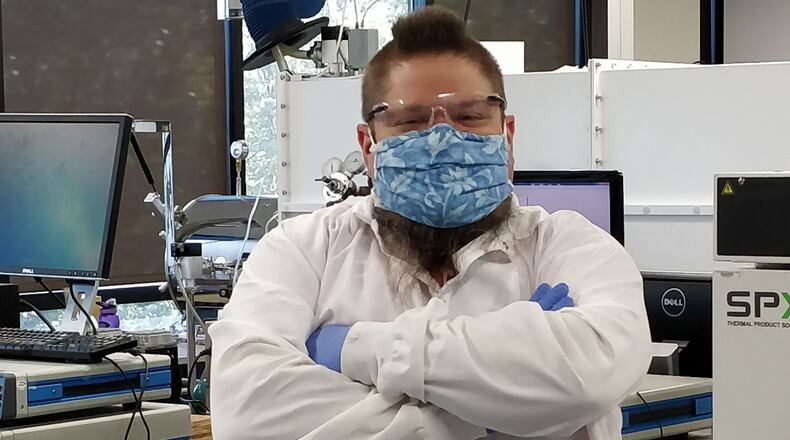Advocates say Estevez' personal story is as inspiring as the innovation he’s trying to market. Estevez himself acknowledges that he is a late bloomer who didn’t really buckle down on his undergraduate studies until he was 30, after years of helping with his family’s restaurant business.
“I started late,” said Estevez, now 48. “I’m lucky, right? I have these opportunities ... but at the same time, I’ve tried to take these opportunities as they come and to make the most of them.”
“He’s just someone you want to bank on,” said Katie Hill, an entrepreneur in residence at The Entrepreneur’s Center (TEC) in Dayton.
“I want to make as much of an impact on the world as possible, and I saw science as a way to do it,” Estevez said.
Estevez started working with nanoparticles and their myriad applications more than a decade ago. He approached TEC with the notion of applying the technology to water-purification purposes well before the global COVID-19 pandemic
That pandemic changed everything, of course. Soon, Estevez and UDRI responded to a call from the National Science Foundation for innovations that address problems tied to COVID.
Masks are made of fibers, a porous material. “If you look at it (a mask) under a microscope, it looks like a bunch of toothpicks laid on top of each other," Estevez said.
In non-scientific terms, his process involves placing or attaching an extremely thin layer of silver nanoparticles evenly across the fibers.
That layer can kill viruses that land of the surface of the mask, he said.
He doesn’t have a prototype yet, and vigorous testing is also ahead, he acknowledges.
What happens next will depend, at least in part, on funding to take the idea to the prototype stage. Esteves said he is not looking for investors now, but he sees as the most promising route “non-diluted funding,” or funding from the government. He is drafting a proposal for the National Science Foundation.
“Nobody cares (about an idea) unless there’s a path to market and there’s a way to actually get this commercialized," Estevez said, paraphrasing Scott Koorndyk, who runs the TEC.
“We banked on the entrepreneurial of talent of Luis really early,” Koorndyk said in an interview with the Dayton Daily News.
Estevez’ start-up, Advanced & Innovative Multifunctional Materials LLC (AIMM), will ultimately create working prototypes, UDRI said. Once prototypes are developed and certified by a medical device testing laboratory, Estevez hopes to partner with and license his mask to a medical equipment company for mass production.
“AIMM is going to be about incredible applications of nano-technology. It’s not going to be about manufacturing masks,” Hill said.
While that does not necessarily mean a large number of potential local jobs, Koorndyk said this idea is still significant and he believe further innovations are possible, all with clear Dayton connections.
“If we’re a net exporter of technology, that’s a great thing for the community,” Koorndyk said.
N95 masks bear that name because they filter a minimum of 95 percent of airborne particles, including viruses and bacteria, Estevez explained.
“While this type of mask is highly effective, there is a critical shortage of masks for healthcare workers — a shortage of hundreds of millions of masks in the U.S. alone, according to some reports," Estevez said in a UDRI release. "So providers are being forced to re-use them, but they are not designed to be re-used because of the risk of infection to themselves and others from handling masks that may have been contaminated by viruses and bacteria.”
Some providers seek to prolong the useful life of masks by such as treating them with steam or hydrogen peroxide, but Estevez contends that such treatments can render the “mask much less effective.”
Estevez argues that what sets his technology apart is his “secret sauce”— a formula for controlling silver particle size, dispersal and adhesion to the surface of the mask.
Estevez has worked with Kenya Crosson, UD associate professor of civil and environmental engineering, to perform proof-of-concept testing on mask material samples.
“Once we have prototype masks in hand, we’ll begin certification and regulatory approvals processes," the researcher said.
“Luis' technology shows a great deal of promise in addressing a critical need, and he has already shown his ability to be an outstanding entrepreneur,” said Mathew Willenbrink, director of technology partnerships at UD. “We are happy to be able to support him in this endeavor.”
About the Author


